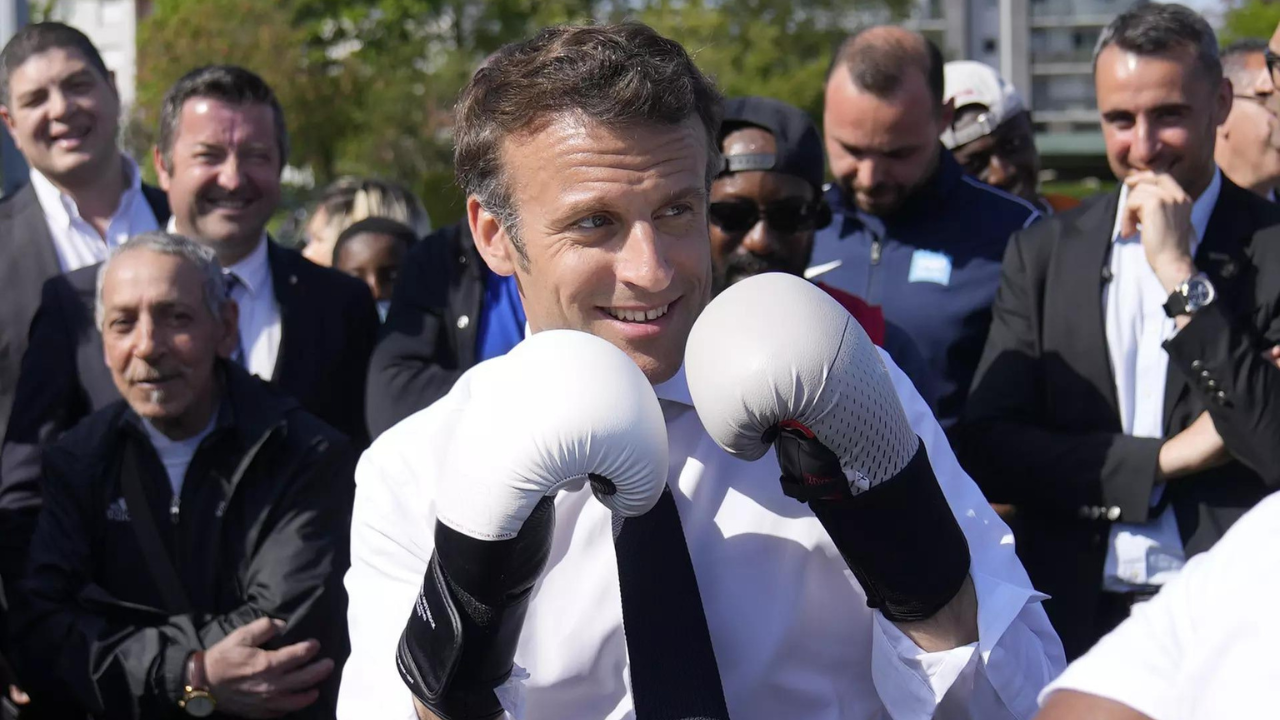NEW DELHI: In an unusual display of athleticism and aggression, French President Emmanuel Macron has captured attention with stark, moody black and white photographs of himself fiercely engaging with a punching bag. The images, circulated by his official photographer on social media, have sparked a spectrum of reactions across Europe, coinciding with Macron’s push for a more robust response to Russia’s invasion of Ukraine.
While some admirers in France have celebrated the 46-year-old leader’s “warrior” demeanor, likening him to iconic movie characters such as Rocky Balboa and Robert DeNiro’s role in “Raging Bull,” the reception has been decidedly cooler across the English Channel. British media and critics have labeled Macron as “macho” and “narcissistic,” with comments ranging from mocking to downright disparaging.
Despite the varied interpretations, many view the boxing photos as Macron’s visual statement to other Western countries, urging a stronger defense stance as the Ukrainian conflict continues. This comes in the wake of his controversial remarks last month about the potential for Western military involvement in Ukraine, which stirred significant debate among global leaders.
Historically, political figures have frequently employed physical imagery to signify vigor and resolve. From Vladimir Putin’s virile displays to the American tradition of presidents embodying the cowboy archetype, such representations are commonplace yet fraught with potential missteps. Notably, Macron’s past physical confrontations, including a memorable handshake battle with former US President Donald Trump, have highlighted his appreciation for the symbolic weight of physicality in politics.
Critics and supporters alike note that Macron’s engagement with boxing, a sport resonating with both strength and strategy, might be aimed at projecting a multifaceted image: one of health, youth, and decisiveness. This strategic move aligns with Macron’s known attention to his public persona and his active use of social media to sculpt his image.
However, the reactions to Macron’s latest photo op are not without detractors. From accusations of embodying “masculinist codes” to criticisms of adopting superficial political communication tactics, the French president’s boxing portrayal has undeniably struck a chord. Yet, it also reflects a broader trend among politicians leveraging sports to resonate with contemporary values and demographics.
As Macron continues to champion sports as vehicles for societal values, and with the Paris Olympics on the horizon, this recent foray into boxing may well be another chapter in his ongoing narrative of leadership. But whether these images will enhance his stature or serve as fodder for his critics remains to be seen in the evolving landscape of political imagery and public perception.
(With inputs from agencies)
While some admirers in France have celebrated the 46-year-old leader’s “warrior” demeanor, likening him to iconic movie characters such as Rocky Balboa and Robert DeNiro’s role in “Raging Bull,” the reception has been decidedly cooler across the English Channel. British media and critics have labeled Macron as “macho” and “narcissistic,” with comments ranging from mocking to downright disparaging.
Despite the varied interpretations, many view the boxing photos as Macron’s visual statement to other Western countries, urging a stronger defense stance as the Ukrainian conflict continues. This comes in the wake of his controversial remarks last month about the potential for Western military involvement in Ukraine, which stirred significant debate among global leaders.
Historically, political figures have frequently employed physical imagery to signify vigor and resolve. From Vladimir Putin’s virile displays to the American tradition of presidents embodying the cowboy archetype, such representations are commonplace yet fraught with potential missteps. Notably, Macron’s past physical confrontations, including a memorable handshake battle with former US President Donald Trump, have highlighted his appreciation for the symbolic weight of physicality in politics.
Critics and supporters alike note that Macron’s engagement with boxing, a sport resonating with both strength and strategy, might be aimed at projecting a multifaceted image: one of health, youth, and decisiveness. This strategic move aligns with Macron’s known attention to his public persona and his active use of social media to sculpt his image.
However, the reactions to Macron’s latest photo op are not without detractors. From accusations of embodying “masculinist codes” to criticisms of adopting superficial political communication tactics, the French president’s boxing portrayal has undeniably struck a chord. Yet, it also reflects a broader trend among politicians leveraging sports to resonate with contemporary values and demographics.
As Macron continues to champion sports as vehicles for societal values, and with the Paris Olympics on the horizon, this recent foray into boxing may well be another chapter in his ongoing narrative of leadership. But whether these images will enhance his stature or serve as fodder for his critics remains to be seen in the evolving landscape of political imagery and public perception.
(With inputs from agencies)

